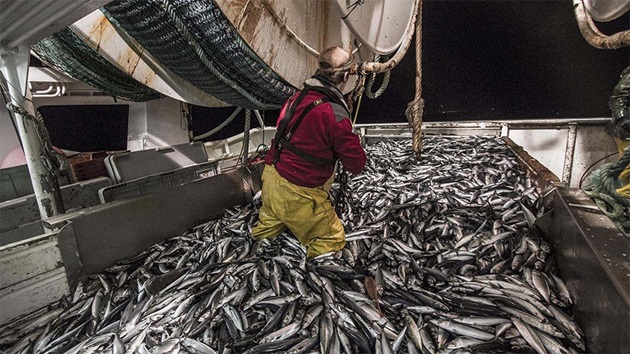Small pelagic fish are a group of small, often schooling species that eat microscopic plants and animals drifting near the ocean surface.
The group consists of different types of fish and common species include herring, sardines, anchovies and mackerel.
Many small pelagic fish serve as a food source for other animals such as larger fish, seabirds and marine mammals. These fish are known as ‘forage fish’ or ‘low-trophic level species’. Some species of krill and squid are also considered forage fish because many animals rely on them as a food source.
Why are small pelagic fish important?
Small pelagic fish play a vital role in the wider marine ecosystem, providing a key source of food for many marine species and underpinning major food webs. In addition to supporting marine ecosystems, small pelagic fish provide critical nutrition for many vulnerable coastal communities in the Global South.
Small pelagic species are also some of the world’s most caught and traded fish, making up MSC Briefing: Small Pelagic Fisheries 2021 It is important this production can be sustained.
The collapse of small pelagic stocks would not only impact the wider marine ecosystem but also the communities reliant on the fish for their livelihoods and/or source of protein. If stocks crash, this could create an unbalanced ocean ecosystem which is less able to adapt to environmental change.
Production and consumption of small pelagic fish
Many small pelagic fish are caught for human consumption in products like tinned mackerel or sardines. However, 19% of global wild-capture fish production (96.4 million tonnes) is used by the wider food industry, with small pelagics being reduced into fish oil and fishmeal.
Fishmeal is a protein-rich, flour-like product used to supplement feed for livestock, pet food or farmed fish. Small pelagics provide a vital source of protein and omega-3 for farmed salmon, which eat smaller fish in the wild.
Fish oil is a valuable by-product of the production of fishmeal and is used in aquaculture feeds and omega-3 supplements for humans.
Conservation challenges of small pelagic fisheries
Our oceans face a multitude of threats from climate change to pollution, with around 46% of small pelagic fish stocks currently overfished. The biological characteristics of small pelagic fish – being fast growing, highly productive and short-lived – means they respond dramatically and quickly to changes in ocean climate. Stocks have already begun to adapt to climatic changes by shifting their distributions towards the North and South Poles.
Changes to the distribution of small pelagic stocks can lead to disputes between governments over how to share fishery resources. A challenge that was recently faced by a number of fisheries for mackerel, herring and blue whiting in the MSC program in the Northeast Atlantic. Effective fisheries management, collaboration between governments, scientists and the fishing industry will be vital to delivering and maintaining sustainable stocks.
Small pelagic fish and aquaculture production challenges
Although research and development is being undertaken by the aquaculture industry to reduce the reliance on small pelagics – using algae, plants or even insects – 75% of global fishmeal produced is currently destined for use in the aquaculture industry. There is also a growing demand for farmed fish, with 59% of fish for human consumption, expected to be supplied by aquaculture by 2030 (currently at 52%). To meet the rising demand for farmed fish, all actors in the seafood supply chain must work together to ensure small pelagic fish are being harvested and sourced sustainably.
Is it OK to eat small pelagic fish?
Yes, if the fish are sourced from fisheries that are managed and operate responsibly. As of 2020, there are 56 fisheries targeting small pelagic species in the MSC program. These fisheries collectively land around five million tonnes a year, around a fifth of the global small pelagic catch. In Mexico, the country’s largest fishery by volume – the Small Pelagics Fishery in Sonora, Gulf of California – has been certified since 2011. Its decade long collaboration with a local marine organisation, has helped ensure its practices remain sustainable and do not impact other local marine populations.
Certification of small pelagic fisheries is driving positive change but requires cross-sector collaboration to ensure a sustainable future. To secure food supplies for future generations we need stronger commitments to sustainable sourcing from across the seafood supply chain.
Read our MSC 01 Briefing: Small Pelagic Fisheries for a full analysis of this complex topic and recommendations of how small pelagic fish can be sustainably managed.

